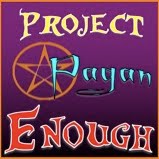
Image via Wikipedia
Emilyperson left a great comment on Friday’s post:
I’m curious, when you first started hanging around Pagans, was there a lot of jargon that confused your young Christian self? I wouldn’t expect you to have been familiar with things like different deities, symbols, and procedures, but does the slang tend to be as far from mainstream American slang as the fundamentalists’?
To be honest, I can’t say as I recall much about my early exposure to Paganism. It would be hard for me to evaluate how I handled the introduction to Pagan, Wiccan, and psychic concepts and terminology thirteen years ago. So rather than trying to remember, I’m going to just take a look at how I perceive such jargon now, how it relates to Wicca, Paganism, and psychic phenomena/practices, and try to guess how an “outsider” or “newbie” might perceive and experience an encounter with such terminology.[1]
I think that Pagan, Wiccan, and psychic jargon can be just as offbeat and unusual as fundamentalist Christian jargon. And to be frank, there is a lot of it, due to the great diversity of practices and beliefs that falls under those collective umbrellas (each one is pretty broad and contains great diversity in its own right).
However, I also think that the jargon isn’t quite as central to the Pagan/Wiccan/psychic identities. You can learn a lot about all of those things without coming into contact with terms like “chakras,” “arcana,” “ardanes,” and “visualization.” You can learn a lot of the basics and get a lot of information before delving into such technical, specialized terms.
Compare this to fundamentalist and even evangelical Christianity, where the first step involves being “born again,” which is a jargon-y term. In reality, I think fundamentalist jargon and one’s knowledge of it is often used as part of the fundamentalist identity and a way to prove oneself part of the “in crowd.”
This brings me up to my second point, in which I think the religio-magical movements I’m now a part of tend to be far better at presenting our jargon to “outsiders” in an accessible way. This is done both through personal conversations and the constantly growing introductory literature available.
I think this can at least partly be attributed to the fact that these are relatively new movements and that many of the adherents are still converts rather than people who were raised by Pagan parents[2]. As such, they are religious movements that are more geared towards welcoming new members and making everything understandable and accessible, even to the point of often anticipating what terms may be unfamiliar to the “uninitiated.”
Fundamentalists, on the other hand, tend to be more insular and seem to just expect everyone to automatically know what it means to be “born again,” “sanctified,” or “demonically oppressed.”
Notes:
[1] It would be awesome if any “newbies” and “outsiders” would pipe up in comments and offer their thoughts.
[2] This certainly isn’t universal. I do know a growing number of second-generation Pagans and a few third-generation Pagans. However, I think we converts outnumber them considerably.












